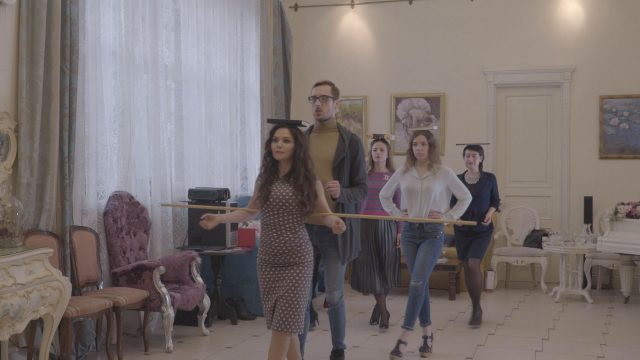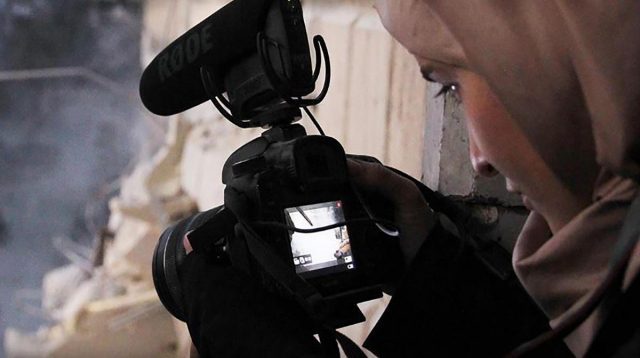
School of Seduction: 3 Stories from Russia follows three women learning how to snare a man
SCHOOL OF SEDUCTION: 3 STORIES FROM RUSSIA (Alina Rudnitskaya, 2019)
IFC Center
323 Sixth Ave. at West Third St.
Saturday, November 9, 9:15
Festival runs November 6-15
www.docnyc.net
In 2009, Russian filmmaker Alina Rudnitskaya made the short film Bitch Academy, about a school where a man taught women of all ages how to attract potential husbands the old-fashioned way, by flaunting their sexuality and playing dumb. She has now expanded that into the full-length feature documentary School of Seduction: 3 Stories from Russia, making its North American debut at IFC Center as part of the DOC NYC festival. Rudnitskaya follows three women over seven years as they take the workshop run by Vladimir Rakovsky and then apply what they’ve learned to their life, with varying degrees of success. Rakovsky, a former 911 hotline worker who is not exactly a smooth-talking Romeo or Don Juan — he actually talks and acts like someone you might avoid on the subway — teaches the women how to bend over, how to wiggle their butts, and how to jump in a man’s arms and turn him on. “What did you think it was about? The psychological aspects of gender politics in modern society?” he says, defending his techniques, which are questionable at best in the twenty-first century (or any time, really). But there is a severe shortage of available men in Russia, so he convinces the eager women that they need to play this game in order to snag a wealthy suitor, that they are not able to survive in this world on their own.
“What a nightmare!” Lida Lodigenskaya declares about Rakovsky’s ideals. Lida lives with her mother and is in love with a married father of two. She is combative and determined, sure that he will eventually leave his wife; surprisingly, he allows himself to be filmed with Lida despite his personal situation. Vika Sitnik is in a lackluster marriage and is in the process of opening a lingerie store in a mall. She suffers from anxiety, sharing her fears with a psychologist. Her mother does not understand her crisis, stuck in the old ways. “I feel bad inside,” Vika says as she reaches a turning point in her life. Diana Belova is a single mother whose parents threw her out of the house so she lives with her grandmother. She makes the most out of the workshop, creating a fake, fanciful existence built on attractiveness and elegance. “I believe in fairy tales,” she says as she meets a series of men, not searching for true love but for someone who will be able to give her the upper-crust life she feels she deserves. “I need to be the best,” she explains.
Rudnitskaya is not making fun of any of these people but rather focusing on the difficulty women are having finding the right person to share their life. They have been reduced to becoming kewpie dolls to catch and keep a man, which is both sad and heartbreaking to watch. The film is screening on November 9 at 9:15, with executive producers Sigrid Jonsson Dyekjær, Eva Mulvad, and Rose Grönkjær in attendance to talk about the film.
ELLIOTT ERWITT — SILENCE SOUNDS GOOD (Adriana Lopez Sanfeliu, 2019)
IFC Center
323 Sixth Ave. at West Third St.
Sunday, November 10, 4:30
www.docnyc.net
“I hate to give explanations,” photographer Elliott Erwitt says in Adriana Lopez Sanfeliu’s lighthearted Elliott Erwitt — Silence Sounds Good, having its North American premiere November 10 at IFC Center as part of the DOC NYC festival. Sanfeliu, a protégé of Erwitt’s, follows her mentor around the world for two years as he goes through his vast archives; exercises in his Manhattan apartment overlooking the park; returns to Cuba for a new book and exhibition and meets former ballerina and choreographer Alicia Alonso, who passed away last month at the age of ninety-eight; snaps pictures on the street at the spur of the moment; and shows some of his iconic images, including photos of presidents and popes, a series on dogs (especially one that steals his heart in Cuba), a photo of segregated drinking fountains in North Carolina, and others that reveal his innate sense of composition. But he doesn’t have a lot to say about them; “I’m not very good about talking about pictures,” he notes at an illustrated lecture.
Now eighty-nine, Erwitt, who was born in France, moved to Italy when he was three, then came to the United States when he was ten, has a dry, self-effacing sense of humor, although he has a tremendous amount of fun taking unusual self-portraits. Sanfeliu often lets her camera linger on him as he sits quietly, with nothing more to say, preferring to let his work speak for itself. “Photography is about having a point of view, nothing else,” he says. “With calm, but also with passion. But without making too much noise about it. It’s the photo which must make noise.” When he does pontificate, he has a tendency to come up with some doozies. “I don’t think anything is serious,” he says. “Nothing is serious, and everything is serious. . . . Well, it’s one of those conundrums. You might say that I’m serious about not being serious.” Erwitt will be at the DOC NYC screening to perhaps talk about it — he does appreciate his silence — along with Sanfeliu, producer François Bertrand, editor Scott Stevenson, and writer Mark Monroe. Preceding it is Tasha Van Zandt’s fourteen-minute short One Thousand Stories: The Making of a Mural, about JR’s video mural project, The Chronicles of San Francisco.

Waad al-Kateab documents daily life under constant bombardment in Aleppo in For Sama
FOR SAMA (Waad al-Kateab & Edward Watts, 2019)
Cinepolis Chelsea
260 West 23rd St.
Sunday, November 10, 11:00 am
Monday, November 11, 1:25
www.docnyc.net
www.forsamafilm.com
“You’re the most beautiful thing in our life, but what a life I’ve brought you into. You didn’t choose this. Will you ever forgive me?” Waad al-Kateab asks in the extraordinary documentary For Sama. In 2012 during the Arab Spring, Waad, a marketing student at Aleppo University, joined the protests against the regime of President Bashar al-Assad. She started taking photos and cell-phone video, then got a film camera as she became a citizen journalist, documenting the escalating conflict, trying to find moments of joy amid the brutal, senseless murders of innocent men, women, and children. She met and fell in love with heroic doctor Hamza al-Kateab, who was determined to keep his hospital running as the bombings got closer. Waad and Hamza got married, and on January 1, 2016, she gave birth to a healthy girl, Sama.
The film, directed by Waad (who also served as cinematographer and producer) and Edward Watts (Escape from ISIS), is a poignant, unflinching confession from mother to daughter, explaining in graphic detail what the families of Aleppo are going through as Russian and Syrian forces and Islamic extremists maintain a constant attack. “We never thought the world would let this happen,” Waad explains as the body count rises — which she intimately shows, not shying away from shots of bloodied victims being brought into the hospital, a pile of dead children, or a desperate attempt to save the life of a mother and a newborn after an emergency caesarean. “I keep filming. It gives me a reason to be here. It makes the nightmares feel worthwhile,” Waad says.
She captures bombings as they happen, films families huddled inside their homes while machine guns can be heard outside, talks to a child who says he wants to be an architect when he grows up so he can rebuild Aleppo. Because she is a woman, Waad gains access to other women that would not be available to a male filmmaker as they share their stories of love and despair. Waad and Hamza plant a lovely garden to bring color to the dank, brown and gray city. A snowfall covers the turmoil in a beautiful sheet of white. The pitter-patter of rain offers a brief respite. But everything eventually gets destroyed as Waad and Hamza struggle with the choice of leaving with Sama or staying to continue their critical roles in the rebellion, she depicting the personal, heart-wrenching images of war — in 2016, her Inside Aleppo reports aired on British television — he tending to the ever-increasing wounded. “The happiness you brought was laced with fear,” Waad tells Sama in voiceover narration. “Our new life with you felt so fragile, as the freedom we felt in Aleppo.” Winner of the Prix L’Œil d’Or for Best Documentary at Cannes among other awards, For Sama is screening at Cinepolis Chelsea on November 10 and 11 as part of the DOC NYC festival, with director Waad al-Kateab, codirector Edward Watts, and subject Dr. Hamza al-Kateab expected to attend to discuss the film.